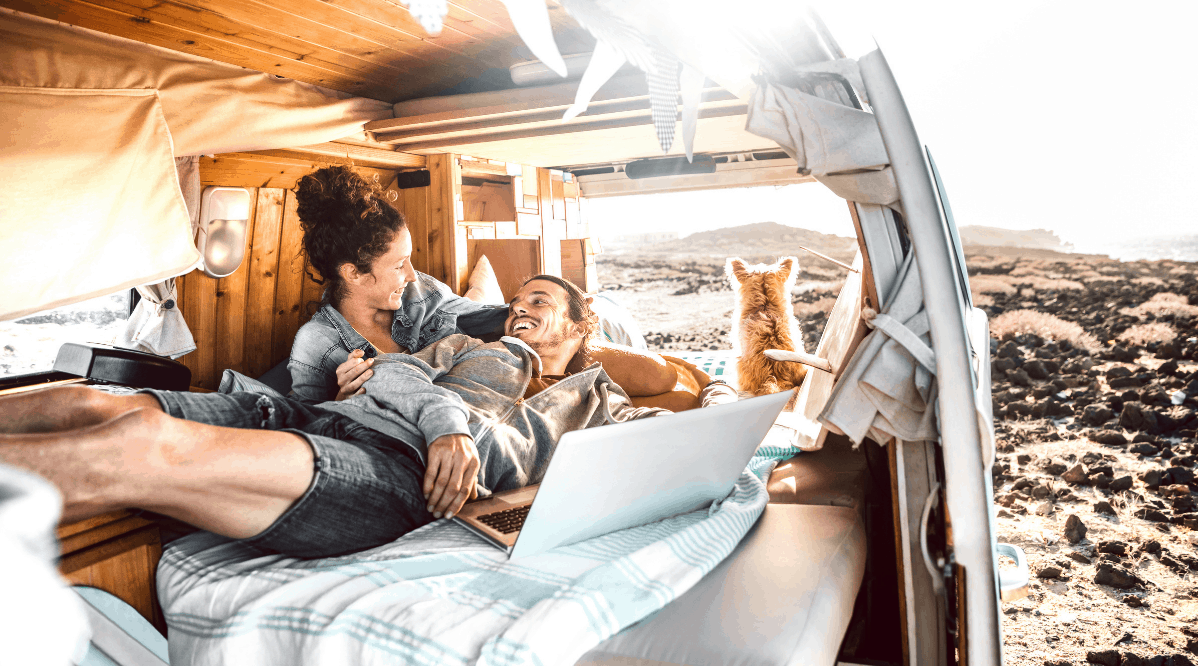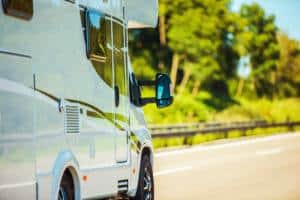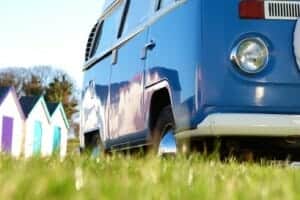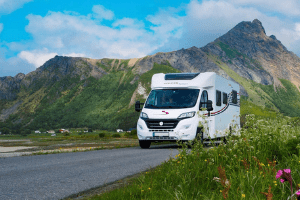What is self-build campervan insurance?
When it comes to buying a motorhome or campervan, there are several types you can choose from, including coach-built motorcaravans, A-class motorhomes, low profile American motorhomes, and race trucks. However, for some, there is nothing better than creating something truly personal by building their own campervan.
By building from scratch, or converting a standard van into a campervan, you are totally invested in creating the ultimate personalised vehicle. This is what makes it such an exciting project if you have the time and opportunity to try your hand at it.
However, it’s important to bear in mind that, as with any type of vehicle, you need cover for your self-build. Campervan conversion insurance is the protection your project will need and, given the bespoke nature of self-built campervans, you will need to go to a specialist insurer that can offer cover tailored to your unique vehicle.
At Comfort Insurance, we have over 30 years’ experience within the industry. Our expert team can advise you on how to insure a campervan conversion. We will work to secure the best self-build campervan conversion insurance policy for you. We understand the importance of safeguarding the vehicle you’ve worked so hard on.
If you’ve self-built your campervan at home and want to find out more about the best insurance for campervan conversions like yours, speak to our friendly team by calling 0208 9840 666 and we’ll guide you through the process from there.

Do you need self-build campervan insurance?
If you’ve converted a van into a campervan or built a vehicle from scratch, you’ll need to get the correct form of insurance. As stated on your V5C form (vehicle log book), a converted campervan is no longer classified as a standard van and your insurance will need to be updated.
Just like motorhome insurance, if you want to take your new self-build/converted campervan on the road, at the very least you’ll need third-party insurance. This will cover the basics.
However, if you’ve spent a lot of time making meticulous alterations and modifications to your vehicle, you’ll probably want to have it protected under a fully comprehensive, dedicated insurance policy that is specifically built to cater to bespoke conversions. This cover is usually known as campervan conversion insurance or self-build campervan insurance.
In addition to this, you will need to consider that your DIY campervan conversion needs to meet certain criteria for it to be classed as a campervan. If it meets the criteria, it can then be insurable and you can proceed with taking out van conversion insurance.
What are the requirements for a campervan conversion?
So, when does a van become a campervan? It’s likely you’ve spent time sourcing your own parts from manufacturers and this enabled you to make the necessary modifications and conversions to create your perfect self-made campervan.
And you’re not alone. Self-build campervans are extremely popular among those who have a keen interest in conversions, as well as mechanics who enjoy having the freedom to come up with their own designs and layouts for their vehicles.
However, for your project to be classified as a campervan and for you to be able to get self-build campervan conversion insurance – there are some steps you need to take for your vehicle to be classed as a motorcaravan by the DVLA. These steps include meeting government-enforced criteria.
To get insurance from us, your new-look campervan also needs to meet our criteria. These requirements are designed for those who have modified their van and are seeking conversion insurance. The criteria are different for those who have opted for a professional conversion and those whose campervan is self-built.
What are our criteria?
We’ve set our criteria to meet the requirements for self-build campervan conversion insurance:
- At least one bed with a minimum length of 6 feet or 1,800mm. This can be converted at night from seats used for other purposes during the day, but it must be permanently fixed within the body of the vehicle. It can be made up from other fixed seats within the vehicle.
- There must be permanently enclosed fixed storage, such as wardrobes, cupboards or lockers.
- Permanent fixed water installation to be connected to a fixed water storage tank or container.
- Seating arrangements for diners to sit at a table. The table may be detachable but must have a permanent way of attaching to the vehicle.
- Fixed cooking or heating facility powered by gas or electricity. Installation of this must have an engineer's report and/or electricity and gas to be certificated. A certificate must be provided in the event of a claim or audit.
- A door that provides access to the living accommodation.
- A minimum of one window on each side of the habitation part of the vehicle.
- Register the vehicle as a motorcaravan with the DVLA*.
Furthermore, all the features added to the vehicle must be a permanent installation, meaning that if any further alterations are made they must be compliant with the above criteria. This is especially important when it comes to self-build campervan insurance policies as if modifications are made without prior notice your policy could become void.
You can see the full list of guidance for converting a vehicle on the Department for Transport website. To find out more about the requirements for updating your vehicle, you’ll also find this information on the GOV.UK site.
*If your campervan conversion has been classified as a van with side windows by the DVLA and not a motorcaravan, but otherwise meets all of the criteria listed above, we may be able to offer you a quotation. Give our insurance experts a call on 0208 9840 666 for more information.
How to reclassify your converted campervan
Once you believe your van to campervan conversion is complete from a modifications perspective, the next step is to get the vehicle legally reclassified.
For the conversion to classify as a campervan, and therefore for you to be able to take out self-build campervan conversion insurance, the newly modified vehicle must meet the criteria outlined above. This includes seats and a table, sleeping accommodation, cooking facilities and storage facilities. It also needs to be approved by the DVLA.
What to send to the DVLA
Both campervans and motorhomes fall into the DVLA category of motorcaravan. Therefore, you will need to update your logbook (V5C) to reflect that your vehicle is no longer a panel van. You will need an up to date V5C if you need to make a claim or in the event of an audit.
Once the conversion has been completed, you must send the updated logbook back to the DVLA for body type amendment, along with a completed copy of the DVLA’s motorcaravan conversion checklist. This is so the vehicle can be identified properly.
Additionally, to register with the change with DVLA you’ll need to attach photos of the interior and exterior of the vehicle showing registration plates, seating, sleeping, cooking, and storage facilities. The photos you send need to evidence the full extent of the modifications you’ve made to your vehicle.
What criteria need to be met to qualify for campervan conversion insurance?
As well as needing to follow criteria to reclassify your vehicle as a campervan, there are certain criteria you need to meet to be eligible for campervan conversion insurance.
We appreciate that each campervan owner is looking for something special when it comes to their vehicle. That this is why so many choose to make modifications or invest in a self-build campervan. To accommodate these owners, we offer comprehensive insurance that can cover changes made to your vehicle.
However, if you haven’t had your campervan professionally converted by one of our recognised converters and you have carried out the build yourself, certain criteria must be met before you can take out campervan insurance. These rules must be followed ahead of you being considered for a campervan conversion insurance policy.
First of all, if you are looking to insure a converted campervan, you need to be sure your conversion qualifies you for campervan insurance (as outlined above). It should also meet current DVLA guidelines, so it’s worth double-checking that you’ve followed the steps.
We also strongly recommend that you notify us of all modifications you have made. This is so that we can provide a campervan conversion insurance quote for a policy that’s tailored to your vehicle.
Should you not be able to register your vehicle as a motorcaravan with the DVLA, it’s still possible for us to consider you for self-build cover. However, this is done on a case-by-case basis, so we suggest you call us on 0208 9840 666 and we’ll take you through the process.
During this conversation, we’ll ask you about your self-build project. We’ll find out what type of conversion you have made, how many updates have been added, and whether you have a current gas and/ or habitation check certificate in place. This is to see if your self-built campervan meets the requirements.
We’ll let you know right away if we think you qualify for self-build campervan insurance. If we do, we’ll talk you through your options and take you through the policies available to you. Should we not think your vehicle meets the requirements, we’ll let you know straight away.
If you are thinking about investing in a self-build, call us today and see how we can provide you with the best insurance for campervan conversions.
Is it possible to get insured on a part-converted van?
Unfortunately, we are no longer able to accept home or privately converted vehicles mid-conversion. We can only accept such vehicles once the conversion is complete. Ensure you have photographic evidence of the conversion as these might be requested as part of an audit trail in the event of a claim.
If you are unsure if your converted campervan is classed as a completed conversion, contact us and we’ll let you know if your vehicle meets our policy requirements for campervan conversion insurance.
How much does self-build campervan insurance cost?
How much you pay for your campervan conversion insurance policy depends on your personal situation and not everyone pays the same premium for their cover. The reason for this is that the process of providing insurance quotes is treated on a case-by-case basis, and prices tend to fluctuate depending on the finer details of each conversion.
No two conversions are identical, especially if they’re self-build projects rather than professional updates. Therefore, some will have different requirements to others.
If you’ve made any changes to your vehicle, it’s important to declare this to ensure you’re covered for your vehicle’s new spec. Equally, if you’ve purchased a self-build campervan that was already converted when you bought it, let us know before getting a quote as this could also influence the price and level of panel van conversion insurance we can offer you.
It’s also important to bear in mind what changes do and don’t directly qualify as modifications. For example, spray painting your vehicle a different colour probably won’t make any difference to your premium. However, other changes like changing the suspension, engine or steering capacity are likely to impact your insurance.
Either way, it is important to let us know of any changes, big or small, before getting a quote for van conversion insurance. By doing this, we’ll be able to give you an accurate quote so you’re aware of the insurance costs involved.
How to get a self-build campervan insurance quote
At Comfort Insurance, we understand that you want the best cover for your pride and joy, especially after you’ve worked so hard to convert it. As experts in the field, we are skilled in providing campervan conversion insurance for UK campervan enthusiasts.
To begin the insurance process, call our expert team on 0208 9840 666. We’ll let you know if we think we can help you and will let you know what type of policy might apply to you.
If you have any general questions about cover for self-build caravans, we’re here to help. We’re rated ‘excellent’ on Trustpilot with thousands of reviews from our customers, so get in touch today!





